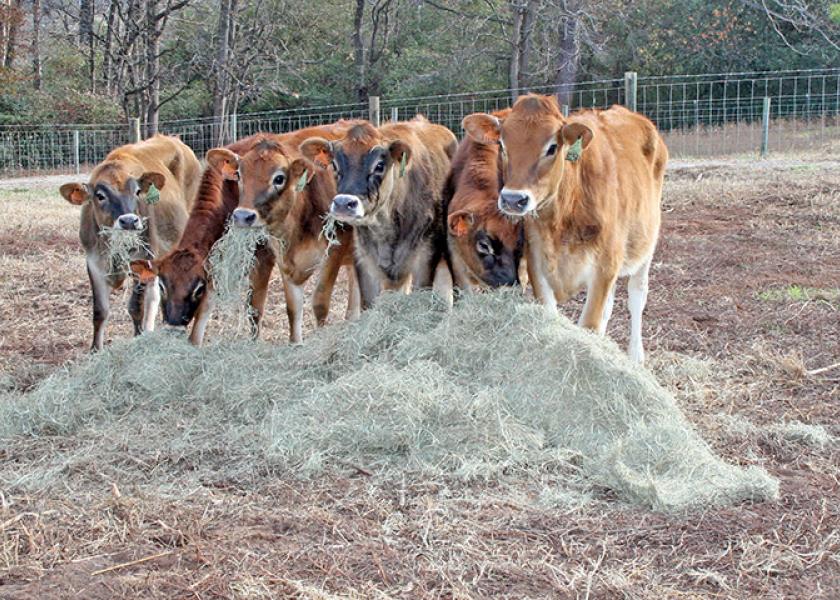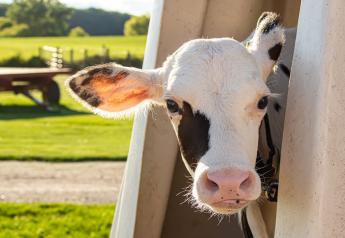UGA Teaching Dairy Welcomes Prize Heifers; First Jerseys in 40 Years

For those who haven’t spent much time with dairy cattle, cows may seem like a pretty predictable bunch.
It’s often graze, rest, chew, line up for milking and graze some more, but one group of University of Georgia College of Agricultural and Environmental Sciences students is about to find out that’s not always the case.
“Jerseys have a unique personality all their own,” said Jillian Fain Bohlen, an assistant professor in the college’s Department of Animal and Dairy Sciences. “Their small size doesn't keep them from having a big personality. They are generally more social and inquisitive than other dairy breeds. By inquisitive, I mean nosy; they are into everything.”
Bohlen, who focuses her research and instruction on dairy cattle, recently organized the donation of six well-pedigreed, 9-month-old Jersey heifers to the UGA Teaching Dairy.
This early holiday gift represents the first Jersey cattle on campus in more than four decades, and a unique learning experience for animal and dairy science students.
“These Jerseys open a number of doors for students,” she said. “They offer different perspectives in milk quality and management. With this, students will learn how to modify and implement new animal husbandry skills. Being a smaller group of animals, they lend themselves well to having students directly immersed in choices regarding their daily care as well as long-term decisions about the herd's development and future.”
Holsteins are generally about 30 percent larger than their Jersey cousins and produce much more milk. That’s why they are the predominant milking breed in the Southeast, where there are fewer dairies and, generally, not enough local milk produced to stock local supermarkets. Jersey dairy cows, on the other hand, produce less milk, but their milk is of a much higher quality and prized for making cheese, butter and ice cream.
The six heifers, who arrived with much fanfare on Dec. 4, were donated by 1985 CAES Department of Animal and Dairy Science alumnus C.A. Russell, who owns the 2,300-head Yosemite Dairy in Hilmar, California. The cows represent some of the best Jersey cattle genetics in North America, Bohlen said. They are in the top 1.5 percent of Jersey cattle.
“They truly define the word ‘elite,’” she said. “To put it into perspective, of all the kids that ever joined the peewee football team, these are the first round draft picks by the NFL.”
“Their superiority will provide additional opportunities to the farm and students in terms of marketing both the program as well as the genetics they offer. Dairy science alumnus C.A. Russell and his family at Yosemite Jerseys definitely gave us the best foundation herd that we could have ever hoped for,” she continued.
Managing a line of cows with such highly regarded pedigrees will take a lot of attention, so Bohlen has set up a student management team that will change every semester. The JAMS—or Jersey Active Management by Students—Team will make all the breeding, care and sales decisions regarding the six heifers and their offspring.
The first JAMS team, which includes students Dall Lee, Simone Lalvani, Emily Wright, Joseph Seta, Victoria Weaver, Kelly Scheulin, Elyssa Jacob, Carleen Porter and Olivia Valente, has already played a major role in forming the Jersey herd. They were in charge of reviewing the pedigree information for dozens of Russell’s calves and then selecting the six who would come to UGA. They also named the ladies: Russell, Athens, Glory, Sanford, Archie and Herschel.
Any proceeds that come from the prize heifer’s offspring will go back into the dairy, helping to support a program that is a keystone to the college’s philosophy of hands-on learning.
“I often tell students that our department is not ‘show and tell,' but that we are ‘feel and smell,’” said Keith Bertrand, head of the college’s Department of Animal and Dairy Science. “We emphasize the fact that the animals on our farms are there to provide students an opportunity to learn animal biology and management not just from a book, but through actively working with animals.”
For more information about the Department of Animal and Dairy Sciences at UGA visit ads.uga.edu. To view a video announcing the selection of the new Jerseys, visit www.youtube.com/watch?v=a9DUzmvc5N0.
Source: University of Georgia







